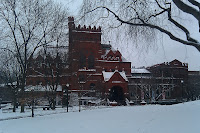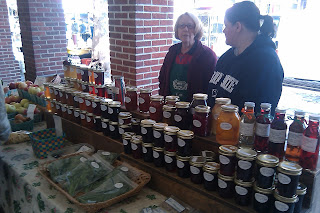Hey everyone, thanks for all the great responses to my previous emails. It's great to hear from you guys back in the motherland. I have a lot to update! We've been really busy on the road so it's been difficult to find time to sit down and write an email to everyone, but it's cold and rainy in Bucharest right now so it seems like the perfect time to stay in and catch up. I've split my photos into separate albums by city - you can see all of them here:
Picasa Albums
Here are some highlights from the albums:
Our second day in Krakow, Poland we arranged for an excursion to the concentration camps at Auschwitz, about an hour outside the city. The weather was cold and rainy, but it seemed fitting for such a somber place. We started our tour at Auschwitz I, the original concentration camp. In history classes I had learned a lot about the horrible conditions at these camps but to see it in person was a whole new experience. Most people only survived a few months at the camp. Hardly anyone lived over one year. They were given the most meager rations of food, forced to work 10-12 hours a day outdoors without proper clothing or equipment, and slept in overcrowded bunks rife with disease and insects. When anyone became too weak to work they were simply killed. Since everyone was underfed, weak, and spoke different languages, it was impossible for them to plan any type of rebellion. Those who disobeyed the officers in any way were subjected to the most inhumane and demoralizing punishments. It's really impossible for me to understand how these SS officers could treat fellow human beings like this without a second thought.
From Auschwitz I, we traveled about 3km down the road to Auschwitz II/Birkenau (there is also an Auschwitz III/Morowitz but I don't think it's open to the public). When the Nazis learned that the Red Army was approaching they tried to destroy all evidence of the camps, so Birkenau mostly consists of the main building and the stone chimneys from the barracks. These living conditions were even worse than those at Auschwitz since prisoners were kept in poorly-insulated wooden stables without any heat. The entire camp was divided by the railroad tracks through the middle, where hundreds of prisoners would be unloaded from cattle cars and separated - the men on one side and the women on the other. Just like Auschwitz, prisoners were hardly fed anything and simply worked to death.
"Those who cannot remember the past are condemned to repeat it." - George Santayana. This quote was printed on the wall in one of the blocks at Auschwitz, and was reflected in the fact that survivors from the camps returned just two years after liberation to collect evidence and establish the state museum. It was a long and emotionally difficult day, but an invaluable learning experience about the atrocities that can happen when human decency has been forsaken.
Jing and I arrived in Prague early from our overnight train so we dropped our bags off at the hostel and spent the first day exploring the main part of the old city. Of all the cities we've been to, Prague reminded me the most of western Europe - including the massive crowds of tourists everywhere. If you asked either of us at the end of our stay what our impression of Prague was, it would be one word: overwhelming. The first day we pushed our way through the main square with it's Gothic town hall and cathedrals to the river front where we found some breathing room and a quiet park to eat lunch. The rest of the afternoon we wandered along the far side of the riverbank through a city park with lots of art museums. We also rode the funicular to the top of the hill to see the gardens and get a better view of the city. The next day we made our way back up the hill to the basilica and palace, part of the old fortress. We lucked out and saw the changing of the guards at noon before we headed back into the city for the bus to Budapest.
The country of Hungary is in a world of its own compared to the rest of eastern and central Europe. Jing is proficient in Russian from her stay in Ukraine and has been able to manage the Slavic languages of Ukraine, Poland and the Czech Republic. When all else fails I take a wild stab at translation using what I know about French and Spanish. But Hungarian was completely unintelligible to both of us. Fortunately I had visited Budapest in 2008 while studying abroad in France so I was a little familiar with the city. So we just set out on our merry way exploring the city and trying to stay out of everyone's way. Budapest is actually two cities, Buda and Pest, with the Danube river between them. The first day we spent in the older city of Buda exploring the hilltop fortresses and castles. We took a meandering path up the hill through a forested park, which was a really nice break from the hustle and bustle of the city below. From the citadel at the top we made our way to the other side with the palace, home of the president, and the old Fishermen's Bastion. All provided great views of the river and Pest on the other side. The next day was rainy so we stayed in Pest and spent most of our time in the Museum of Terror, with artifacts from the Soviet occupation of Budapest after World War II (no pictures allowed inside). Most of my history classes in school did not cover much material after WWII and I'm too young to remember anything from the news firsthand, so this was the first I've really learned about eastern Europe and the USSR between the 1940s and the 1990s. It was eye-opening to say the least.
Before I left the States, my friend Peter contacted me about adding Slovenia to our itinerary. I'm so glad we took his advice - Ljubljana (the capital) has definitely been our favorite destination so far. Peter, the swim club president from Embry-Riddle University whom I met at our national meet, is from Slovenia and comes home every summer to visit his family. He invited us to stay in his sister's apartment, and his mother cooked us some great homemade meals while we were there. When we arrived in Ljubljana Peter was at a swim meet so he encouraged us to spend the morning at the castle in the old city. Afterwards we met up with Peter and his friend Miha (another swimmer) to see Lake Bled, a 20-minute ride outside the city. The views of the lake and the Alps in the background were absolutely stunning. Later we went to the national championship swim meet and cheered for Peter. On the way home we stopped at a food stand and the boys convinced us to try horse burgers! They tasted okay, but I'm not sure I would eat one again. It was Jing's birthday so while we were out Peter's mom baked her a cake. Then another of Peter's friends, Magda, joined us and we went out for drinks to celebrate with the birthday girl. The next day Jing and I spent some more time in the old city, and Peter took us to a park along a river in the afternoon. We hiked to the top of the hill where a restaurant served special concoctions of Union beer, brewed in Ljubljana. When we got back we thanked Peter's family for their wonderful hospitality, traded hugs, and headed out for our bus to Belgrade.



















